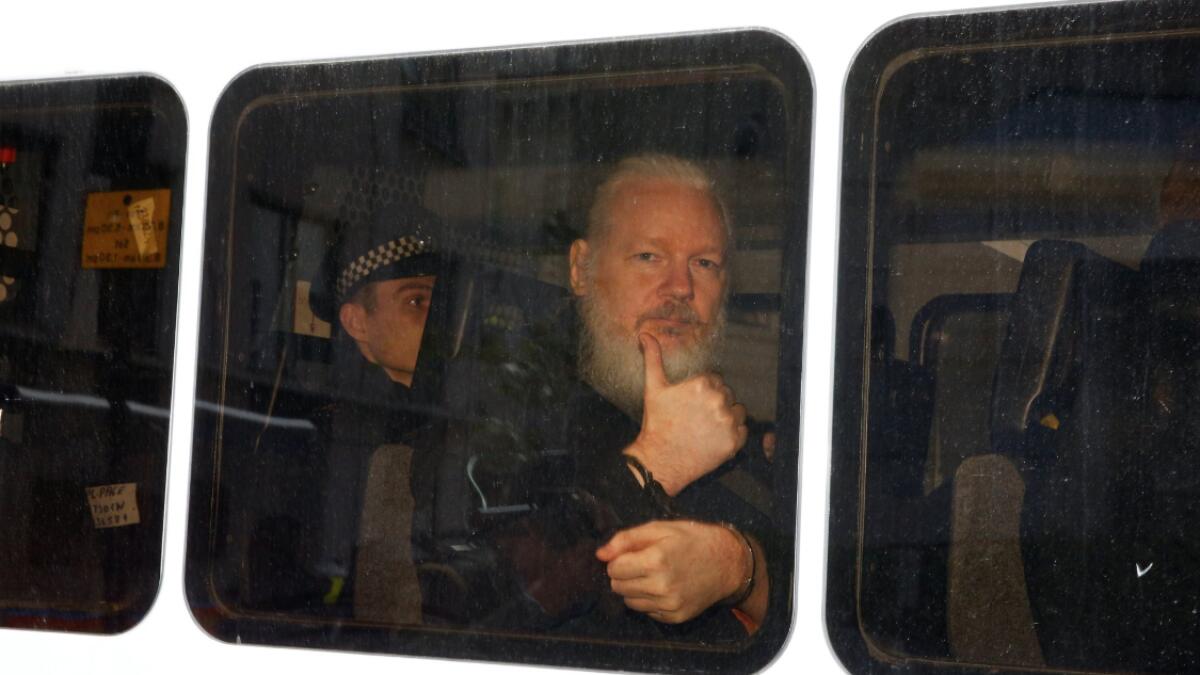He was arrested by the British police at Ecuadorean embassy.
Published: Fri 12 Apr 2019, 1:47 PM
British police dragged Julian Assange out of the Ecuadorean embassy on Thursday after his seven-year asylum was revoked, paving the way for his extradition to the United States for one of the biggest ever leaks of classified information.
The frail-looking WikiLeaks founder, with white hair and a long beard, was carried head first out of the embassy in London shortly after 0900 GMT by at least seven men to a waiting police van, after shouting "This is unlawful, I'm not leaving."
British Prime Minister Theresa May hailed the news in parliament, to cheers and cries of 'Hear, hear!' from lawmakers.
"The whole House will welcome the news this morning that the Metropolitan Police have arrested Julian Assange, arrested for breach of bail after nearly seven years in the Ecuadorean embassy," May said.
Appearing before a London court, Assange said he was not guilty of failing to surrender in 2012. District judge Michael Snow, who cast Assange as a 'narcissist', convicted him of skipping bail. Sentencing will be at a later date.
Assange's lawyer in Quito said his life would be in danger if he were to be extradited to the United States.
Police said they had arrested Assange, 47, after being invited into the embassy following the Ecuadorean government's withdrawal of asylum. Assange was carried out of the building carrying a copy of Gore Vidal's History of The National Security State, which he continued reading in court.
Just hours later, US prosecutors said they had charged Assange with conspiracy in trying to access a classified US government computer with former US Army intelligence analyst Chelsea Manning in 2010.
The arrests, after nearly seven years holed up in a few cramped rooms at the embassy, mark one of the most sensational turns in a tumultuous life that has transformed the Australian programmer into a rebel wanted by the United States.
Supporters of Assange, who gave a thumbs up in handcuffs as he was taken from a police station to the court, said Ecuador had betrayed him at the behest of Washington, that the ending of his asylum was illegal and that it marked a dark moment for press freedom.
To some, Assange is a hero for exposing what supporters cast as abuse of power by modern states and for championing free speech. But to others, he is a dangerous rebel who has undermined U.S. security.
WikiLeaks angered Washington by publishing hundreds of thousands of secret US diplomatic cables that laid bare often highly critical US appraisals of world leaders, from Russian President Vladimir Putin to members of the Saudi royal family.
Assange made international headlines in early 2010 when WikiLeaks published a classified US military video showing a 2007 attack by Apache helicopters in Baghdad that killed a dozen people, including two Reuters news staff.
The extent of the diplomacy that led to the arrest was not immediately clear. The Kremlin said it hoped his rights would not be violated.
Assange's indictment arose from a long-running criminal investigation dating back to the administration of former President Barack Obama.
It was triggered in part by WikiLeaks' publication in 2010 of hundreds of thousands of US military reports about the wars in Afghanistan and Iraq and American diplomatic communications.
The US Justice Department said Assange was arrested pursuant to the US/UK Extradition Treaty, and accused him of involvement in one of the largest compromises of classified information in US history.
The indictment said that Assange in March 2010 engaged in a conspiracy to assist Manning in cracking a password stored on US Department of Defense computers connected to the Secret Internet Protocol Network (SIPRNet), a US government network used for classified documents and communications.
"The charge relates to Assange's alleged role in one of the largest compromises of classified information in the history of the United States," the US Justice Department said.

